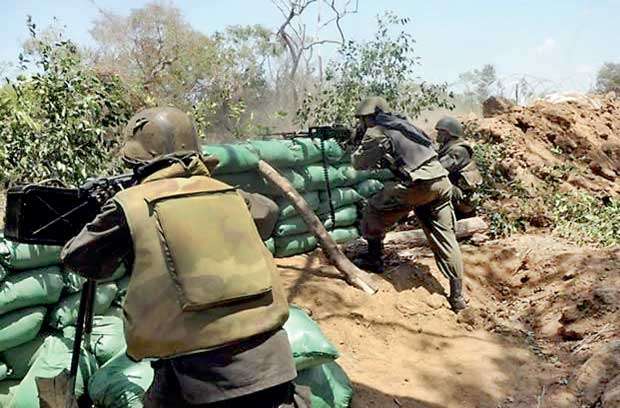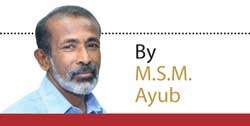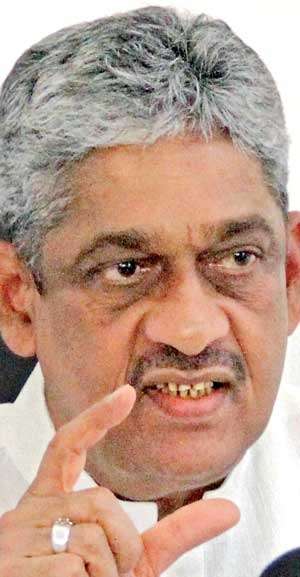Reply To:
Name - Reply Comment

LTTE bogey came to a head when the Rajapaksa loyalists accused Sarath Fonseka, being an LTTE agent when challenged Rajapaksa
Sri Lankan politicians have a habit to look for a nexus between the ethnic issue and anything under the sun, in order to convince their community
The constitutional issues such as the mode of governance are the ones having far-reaching effects on the future of the country as well as its people
 It is interesting and in a way puzzling to note that the political parties and leaders who agitated to scrap the Executive Presidential system of Governance during the height of the separatist war, are now expressing fear to do so, on the grounds that the country would be divided.
It is interesting and in a way puzzling to note that the political parties and leaders who agitated to scrap the Executive Presidential system of Governance during the height of the separatist war, are now expressing fear to do so, on the grounds that the country would be divided.
The Sri Lanka Freedom Party (SLFP) group functioning under former President Mahinda Rajapaksa, Mahajana Eksath Peramuna (MEP) led by Dinesh Gunawardane, Wimal Weerawansa and his party men, who were then members of the Janatha Vimukthi Peramuna (JVP), the group of 16 of the SLFP and many others who are now aligned with the former President were agitating to abolish the Executive Presidency some time back.
At the 2005 Presidential Election, these groups supported the candidacy of Mahinda Rajapaksa, whose main pledge was to do away with the Executive Presidential form of governance.
It was a time when the entire Vanni, a part of the Jaffna Peninsula and many parts of the Eastern Province were under the control of the Liberation Tigers of Tamil Eelam (LTTE) and the United National Front (UNF) Government of Prime Minister Ranil Wickremesinghe was begging the Tamil rebel group to return to the negotiating table.

Even Rajapaksa, who went back on his words to abrogate the previous UNP Government’s Ceasefire Agreement (CFA) and the peace process resumed talks with the LTTE, despite the organisation having attempted on the life of his Army Commander the then Lieutenant General Sarath Fonseka.
Yet, his Government stood for the scrapping of the Executive Presidency, without seeing any danger in doing so. For them, the ethnic issue had then nothing to do with the form of Governance. Soon after Rajapaksa assumed power for the second time in 2010, when there was no longer a separatist war nor a separatist armed group, they tied up the two issues and even now, they remain the same.
Most Sri Lankan politicians have made it a habit to look for a nexus between the ethnic issue and anything under the sun, in order to convince especially their community whatever the point they make and to justify any crime they have committed or alleged to have committed.
Thus, those soldiers who are accused of harming leading journalists such as Lasantha Wickramatunga, Keith Noyahr and Upali Tennakoon, are war heroes as they had fought against the LTTE, whereas the Army Commander who spearheaded a successful war against the separatists is not.
The northern politicians usually do not touch upon an issue that has nothing to do with the ethnic problem. Thus they see everything through the ethnic prism. They criticize their rivals in the region largely for “betraying the Tamil and their interests to the Sinhalese” and rarely for corruption or something unrelated to ethnicity.
Their southern counterparts too, especially those in the Opposition, despite they taking up national issues, always attempt to tie them up with the ethnic issue and accuse their rivals of “betraying the Sinhalese and their interests to the Tamils and to the LTTE.
Thus, the constitution-making process of the Chandrika Kumaratunga Government between 1994 and 2000 was seen by the United National Party (UNP) as a sellout of the country to the LTTE and the UNP members burnt copies of a draft Constitution within the chamber of the Parliament in 2000.
And the same people who were the members of Kumaratunga’s party then and under Mahinda Rajapaksa now, want to scuttle the Constitution making process of the incumbent UNP-led Government, ridiculously on the same grounds.
Their contention is further preposterous in the light of them having participated in the various committees appointed to look into various aspects of the proposed new constitution.
This LTTE bogey came to a head when the Rajapaksa loyalists accused Sarath Fonseka, the war-winning Army Commander, who was acclaimed by leaders of the very Rajapaksa regime as the ‘Best Army Commander’ of the world for “being an LTTE agent,” when he unsuccessfully challenged Rajapaksa at the 2010 Presidential Election.
Soon after Rajapaksa assumed power for the second time in 2010, when there was no longer a separatist war nor a separatist armed group, they tied up the two issues and even now, they remain the same
They also branded Maithripala Sirisena as an LTTE agent, when he announced on November 21, 2014, his decision to contest the Presidential Election in 2015 as the Common Candidate of the Opposition parties.
The then General Secretary of the United Peoples Freedom Alliance (UPFA) Susil Premajayantha in a hurriedly convened media briefing the following day said that the candidacy of Maithripala Sirisena was a result of a conspiracy by foreign powers and separatist forces. One has to understand the stand taken by the Joint Opposition and the Sri Lanka Podujana Peramuna (SLPP) on the 20th Amendment to the Constitution that has been handed over to the Secretary-General of the Parliament by the JVP last week for the abolition of Executive Presidency, against this backdrop.
Their argument is that so long as the 13th Amendment to the Constitution that provided for the devolution of power and the institution of Provincial Councils is in force, the scrapping of the Executive Presidency would lead to the division of the country.
Apart from their above-mentioned history, where they had taken a diametrically different position, the experience of several other countries stands against their current view.
India has successfully crushed secessionist insurgencies in several of her ethnically created States such as Kashmir, Punjab, Assam, Tripura and Mizoram while having a Westminster Style Government in the Centre.
The argument can be applied to the United Kingdom as well, where the Government had defeated a long drawn separatist rebellion in Northern Ireland.
Malaysia and Australia are two more countries that have had devolved power to the periphery, while not having a Presidential rule in the Centre.
Some of those countries have effectively waged wars as well against other countries. (India against Pakistan and Britain against Argentina).
On the other hand, it must be recalled that the Opposition parties during the first Executive President J.R. Jayewardene’s tenure - the SLFP, LSSP, Communist Party, MEP and JVP - accused him for muddling the ethnic rebellion by way of sending his nephew Brigadier Tissa Weeratunga to the north, mishandling the first major attack by the LTTE at Thirunelveli in Jaffna in July 23, 1983, which triggered countrywide anti-Tamil riots, passage of the Sixth Amendment to the Constitution and mishandling the Thimpu talks.
The constitutional issues such as the mode of governance, are the ones having far-reaching effects on the future of the country as well as its people.
In some countries, the Governments conduct their affairs on a Constitution brought in hundreds of years ago. But in Sri Lanka, these issues are viewed as tools to grab power or to sustain the already grabbed power.
If the Rajapaksa loyalists are to argue that their stance in 2005 or in 2010 on Executive Presidency was taken in the light of the political situation prevailed then, they had then been able to see only about few years into the future.
One cannot assure that complete democracy would be heralded once the executive presidency is done away with. But the experience has it that it is not an indispensable tool to handle separatist forces.